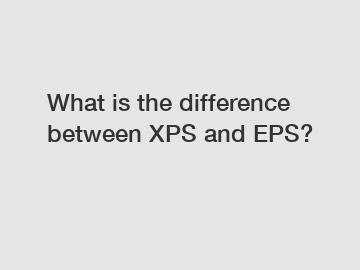Feb. 20, 2024
Rubber & Plastics
Longya Product Page
When it comes to insulation materials, XPS and EPS are two popular choices that often get confused due to their similar-sounding names. However, despite their similarities, there are key differences between the two that can impact their performance and suitability for different applications.
XPS, or extruded polystyrene, is a rigid foam insulation material that is commonly used in building and construction projects. It is made by mixing polystyrene with other chemicals and then extruding the mixture into rigid boards or panels. XPS is known for its high compressive strength, moisture resistance, and thermal performance, making it ideal for insulating walls, roofs, and foundations.

On the other hand, EPS, or expanded polystyrene, is a lightweight and versatile insulation material that is made by expanding polystyrene beads with steam and then molding them into various shapes. EPS is commonly used in packaging, gardening, and construction applications due to its cost-effectiveness, flexibility, and ease of installation.
One of the main differences between XPS and EPS is their manufacturing process. XPS is produced in a continuous extrusion process, which results in a dense and uniform foam with a closed-cell structure. This closed-cell structure gives XPS its excellent thermal performance and resistance to moisture. In contrast, EPS is produced by expanding polystyrene beads in a mold, which results in a more open-cell structure. This open-cell structure can make EPS more prone to moisture absorption, but it also gives it a lower density and higher R-value compared to XPS.
Another difference between XPS and EPS is their compressive strength. XPS is known for its high compressive strength, which makes it suitable for applications where the insulation material will be subjected to heavy loads or pressure, such as under concrete slabs or roadways. On the other hand, EPS has a lower compressive strength, which makes it more suitable for applications where the insulation material will not be subjected to heavy loads.
In terms of cost, EPS is generally more cost-effective than XPS, making it a popular choice for budget-conscious projects. However, the higher thermal performance and moisture resistance of XPS can make it a better long-term investment for projects where these factors are important.
When it comes to environmental impact, both XPS and EPS have their pros and cons. XPS is made from a petroleum-based material and can take hundreds of years to decompose in a landfill. In contrast, EPS is made from a recyclable material and can be easily recycled into new products. However, EPS production does require the use of steam and energy, which can contribute to greenhouse gas emissions.
In terms of fire performance, both XPS and EPS are flammable materials and should be protected with a fire-rated covering or barrier when used in building applications. However, XPS is generally considered to be more fire-resistant than EPS due to its denser and more compact structure.
Overall, the choice between XPS and EPS will depend on the specific requirements of your project, including factors such as cost, compressive strength, thermal performance, moisture resistance, and environmental impact. Consulting with a professional insulation contractor can help you determine the best insulation solution for your needs.
In conclusion, while XPS and EPS may seem similar at first glance, their differences in manufacturing process, compressive strength, cost, environmental impact, and fire performance make them unique insulation materials with their own set of advantages and disadvantages. Understanding these differences can help you make an informed decision when choosing the right insulation material for your project.
If you are looking for more details, kindly visit China Cnc Plastic Machined Parts.
Previous: WQRUBBER - Which Brand Offers the Best Quality Products?
Next: Is expanded PTFE sheet the best gasket material for sealing?
If you are interested in sending in a Guest Blogger Submission,welcome to write for us!
All Comments ( 0 )